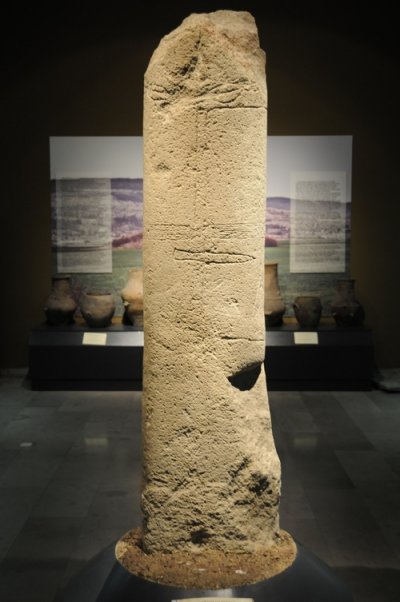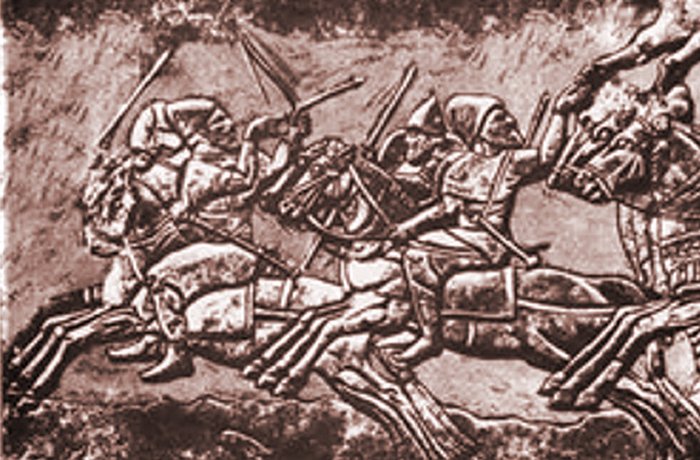Cimmerians – Ancient People Searching For A Home
David Tee - AncientPages.com - Where did the Cimmerians come from? Like most ancient societies, there is no actual knowledge of the origin of the Cimmerians.
These ancient people are supposed to be related to either Iranian or Thracians.
Belogradets, Cimmerian tombstone ca. 700 BCE–ca. 600 BCE. Credit: Varna, Museum of Archaeology, Public Domain
According to Herodotus' writings, the Cimmerians occupied the territory north of the Caucasus and the Black Sea during the 8th and 7th centuries BC (modern Ukraine and Russia).
However, archaeologists have not been able to link the Cimmerians to this specific region.
Through research, though, modern scholars have concluded that the Cimmerians may have been from modern-day Iran and migrated to the steppes of the Black Sea over time.
The Cimmerians Expanded Their Territory
As the Cimmerians began to flourish, they also entertained thoughts of expansion. Their Black Sea home was getting a little tight for their comfort, and they looked to other lands they could occupy. One battle had them defeat the King Midas of Phrygia, who appealed to Sargon II for help, but none came.
King Midas was so humiliated by the defeat that he committed suicide soon after the battle concluded. From there, the Cimmerians moved into Peloponnese and destroyed that area.
These nomadic people also made significant gains against the western empire of the Assyrians and overtook Lydia after an initial defeat.
A Cimmerian warrior (8th century BC) (reconstruction). Image credit: Internet Encyclopedia of Ukraine
One reason for their expansion efforts and desire to conquer other lands is that the Cimmerians were homeless and searching for new ground to call home. It is said that the Scythians drove them out of their original homeland in Southern Russia.
Even their excellent skills at riding horses did not save the Cimmerians from this ignoble defeat.
The Cimmerians And The Merovingian Kings
As history goes, records are lost, and myths and legends fill the void left by the absence of factual information. At one time, the kings of the Merovingian people traced their lineage to what may have been a group or one tribe of the Cimmerian people referred to as the Sicambri.
However, there is no way to tell if the Sicambri were real Cimmerians or a mythical tribe that helped the Merovingian Kings bolster their claim to the royal throne.
Early scholars also tied the Cimmerians to the Celtic people of the British Isles or an earlier version of the Germanic people of present-day Germany.
Can Cimmerians Language Shed Light On Their History?
There is little help from the literary world as the language of the Cimmerians is mainly unrecorded. There are a few names written down in the annals of Assyrian history, but that is about as far as it goes.

A Cimmerian warrior (8th century BC) (reconstruction). Image credit: Internet Encyclopedia of Ukraine
It is believed that the name" Cimmerians" originates from the root word 'gimer' or 'gimir.' Some have linked the Biblical term 'Gomer' to the Cimmerians.
Belgrade, Cimmerian tombstone ca. 700 BCE–ca. 600 BCE. Credit: Varna, Museum of Archaeology, Public Domain
Then there are those scholars who see the Cimmerian people as closely related to the Thracians. Their language is a bridge between the Thracians and the Iranian tongue.
Because of the failure to recover language evidence, it is challenging to trace the early history of the Cimmerians.
Cimmerians' Final Defeat
The Scythians remained their enemy despite driving out the Cimmerians from their homeland in southern Russia. They continued to defeat them well into the 7th century BC.
The Cimmerians were removed from historical records during one battle against the Lydians.
There is not much knowledge about these people after two final defeats at the hands of their enemies. Sadly, the Cimmerians' legacy is left in shambles as all we know of them come from their nomadic wars and a little art left behind in the Black Sea region.
Written by – David Tee - AncientPages.com Staff Writer
Copyright © AncientPages.com All rights reserved. This material may not be published, broadcast, rewritten or redistributed in whole or part without the express written permission of AncientPages.com
Expand for referencesMore From Ancient Pages
-
 Knowledge Of Divine Alien Beings And High-Tech In Ancient Egypt Described In Sacred Books And Papyrus – The God Who Spoke About Time Dilation – Part 1
Featured Stories | May 12, 2021
Knowledge Of Divine Alien Beings And High-Tech In Ancient Egypt Described In Sacred Books And Papyrus – The God Who Spoke About Time Dilation – Part 1
Featured Stories | May 12, 2021 -
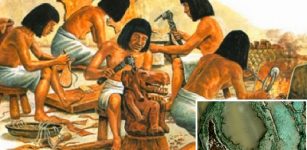 What Ancient Civilization Discovered Metallurgy?
Ancient Technology | Sep 19, 2017
What Ancient Civilization Discovered Metallurgy?
Ancient Technology | Sep 19, 2017 -
 Does A Baffling Artifact Offer Evidence Of Ancient Extraterrestrial Visitation In New Zealand? – The Discovery – Part 1
Featured Stories | Jul 20, 2020
Does A Baffling Artifact Offer Evidence Of Ancient Extraterrestrial Visitation In New Zealand? – The Discovery – Part 1
Featured Stories | Jul 20, 2020 -
 Terrace Farming Was Invented In South American Andes Over 1,000 Years Ago
Ancient History Facts | Sep 7, 2016
Terrace Farming Was Invented In South American Andes Over 1,000 Years Ago
Ancient History Facts | Sep 7, 2016 -
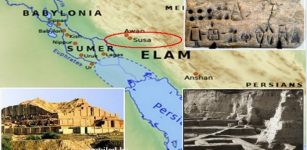 Riddle Of Two Undeciphered Elamite Scripts
Featured Stories | May 19, 2021
Riddle Of Two Undeciphered Elamite Scripts
Featured Stories | May 19, 2021 -
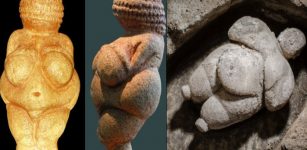 ‘Venus of Willendorf’: New Theory On ‘Venus’ Figurines – Proposed
Artifacts | Dec 1, 2020
‘Venus of Willendorf’: New Theory On ‘Venus’ Figurines – Proposed
Artifacts | Dec 1, 2020 -
 Sunken 18th-Century British Warship HMS Tyger Found In The Dry Tortugas National Park, Florida
Archaeology | Mar 19, 2024
Sunken 18th-Century British Warship HMS Tyger Found In The Dry Tortugas National Park, Florida
Archaeology | Mar 19, 2024 -
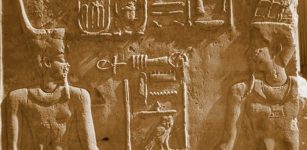 Ancient Treasures Of The Kushite Necropolis At Sedeinga, Northern Sudan
Civilizations | Sep 20, 2015
Ancient Treasures Of The Kushite Necropolis At Sedeinga, Northern Sudan
Civilizations | Sep 20, 2015 -
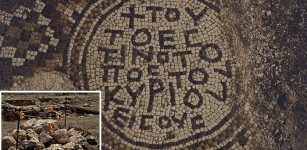 The 6th Century Byzantine Church Hidden Within Khirbet Tinshemet’s Woods – Discovered
Archaeology | Oct 2, 2024
The 6th Century Byzantine Church Hidden Within Khirbet Tinshemet’s Woods – Discovered
Archaeology | Oct 2, 2024 -
 Diver Says He Found Mysterious Underwater Ancient Tomb, Ruins And Artifacts Of An Unknown Advanced Civilization
Featured Stories | Oct 10, 2023
Diver Says He Found Mysterious Underwater Ancient Tomb, Ruins And Artifacts Of An Unknown Advanced Civilization
Featured Stories | Oct 10, 2023 -
 New Dating Of Intriguing Cave Art Reveals History Of Puerto Rican People
Archaeology | Oct 19, 2023
New Dating Of Intriguing Cave Art Reveals History Of Puerto Rican People
Archaeology | Oct 19, 2023 -
 Rök Stone (Rök Runestone): Longest Runic Inscription Ever Discovered
Featured Stories | Jun 12, 2024
Rök Stone (Rök Runestone): Longest Runic Inscription Ever Discovered
Featured Stories | Jun 12, 2024 -
 Just 7% Of Our DNA Is Unique To Modern Humans – We Are Not Much Different From The Neanderthals
Archaeology | Jul 27, 2021
Just 7% Of Our DNA Is Unique To Modern Humans – We Are Not Much Different From The Neanderthals
Archaeology | Jul 27, 2021 -
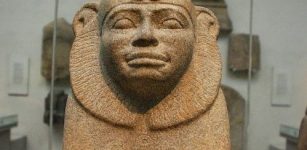 Taharqa – The Most Powerful Of The Black Pharaohs
Featured Stories | Jan 29, 2016
Taharqa – The Most Powerful Of The Black Pharaohs
Featured Stories | Jan 29, 2016 -
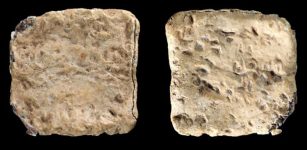 Rare ‘Cursed’ Tablet Predating The Dead Sea Scrolls Discovered On Mount Ebal Could Re-Write History – Scientists Say
Archaeology | Mar 25, 2022
Rare ‘Cursed’ Tablet Predating The Dead Sea Scrolls Discovered On Mount Ebal Could Re-Write History – Scientists Say
Archaeology | Mar 25, 2022 -
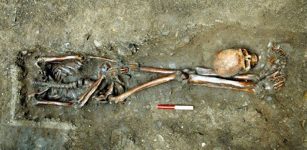 Secrets Of Ancient Skeletons Found In York – Who Were They And Where Did They Come From?
Archaeology | Jan 20, 2016
Secrets Of Ancient Skeletons Found In York – Who Were They And Where Did They Come From?
Archaeology | Jan 20, 2016 -
 Early North Americans Much More Diverse Than Previously Believed
Archaeology | Jan 30, 2020
Early North Americans Much More Diverse Than Previously Believed
Archaeology | Jan 30, 2020 -
 Famous Benin Bronzes Were Made Of German Brass – Study Reveals
Archaeology | Apr 6, 2023
Famous Benin Bronzes Were Made Of German Brass – Study Reveals
Archaeology | Apr 6, 2023 -
 On This Day In History: Battle Of Rain Was Fought On April 15, 1632, During The Thirty Years’ War
News | Apr 15, 2016
On This Day In History: Battle Of Rain Was Fought On April 15, 1632, During The Thirty Years’ War
News | Apr 15, 2016 -
 Recently Found ‘Neanderthal Footprints’ In the South Of Spain Could Be 275,000 Years Old
Featured Stories | Dec 1, 2022
Recently Found ‘Neanderthal Footprints’ In the South Of Spain Could Be 275,000 Years Old
Featured Stories | Dec 1, 2022

